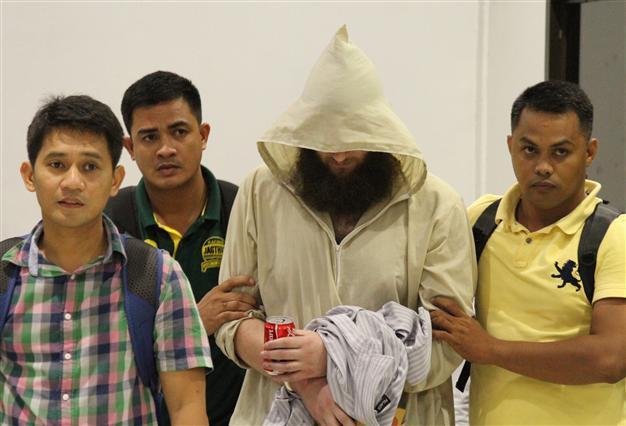Spy chief warns Australians becoming 'extremist propagandists'
SYDNEY - Agence France-Presse

Philippine Immigration officers escort Robert Edward Cerantonio (C), an Australian convert to Islam who used the internet to urge people to join "jihad" in Iraq and Syria, shortly after arriving at Manila airport on July 11, 2014, after he was arrested in Cebu City. AFP Photo
Australians are becoming key players in the successful "social media wars" being waged from Iraq and Syria, increasingly acting as "English-language Islamic extremist propagandists", the country's spy chief has warned.
Australian Security Intelligence Organisation director-general David Irvine said the bloody and often gruesome conflicts were creating a new generation of militants, "the scale and scope of which we have not seen elsewhere".
"The number of Australians who have sought to take part in the Syria and Iraq conflicts, or have sought to support extremists fighting there, is unprecedented," he said in a speech late Tuesday.
Irvine said what was particularly worrying was that many of the fluent English speakers were being used by the Islamic State to get their message out to a broad audience through graphic and highly emotive social media coverage.
"Syria and Iraq are social media wars," he said, adding that the use of Twitter and Facebook had brought the conflicts directly to Australians and others in a way no other war had.
"Extremists use this new media to disseminate their message, interactively bringing their gory barbarity back to Australia, with the aim of radicalising young Australians in real time as they sit at home or wait for buses and trains in the morning."
His comments follow the widespread coverage given this week to a picture of a seven-year-old Australian boy holding a severed head in Syria, with the image widely shared on Twitter and run on newspaper front pages in Australia and elsewhere.
The photo, posted on the Twitter account of the boy's father Khaled Sharrouf -- an Australian who fled to Syria last year and is now an Islamic State fighter -- sparked outrage.
Another showed Sharrouf dressed in camouflage fatigues posing with three young boys, believed to be his sons, all holding guns in front of the flag of the Islamic State.
US Secretary of State John Kerry who was in Sydney when the picture of the rotting head was published, called it "stomach-turning" and said it underscored the brutality of IS.
"And it has been Australians who have been doing this, Australians involved with the worst of the worst in terms of extremist groups inside Syria and Iraq," said Irvine, adding that the intent was to spread panic and fear.
"Australians are now acting as English-language Islamist extremist propagandists, accessing audiences and contacts they could not have dreamed of before social media to connect them.
"They, and other predatory radicalisers, continue to target often already alienated individuals, isolating and then grooming and further radicalising them -- with the conflicts in Syria and Iraq central in their narrative whilst doing so."
Officials have said up to 150 Australians are fighting alongside militants overseas, mostly in Iraq and Syria.
Many other countries also have nationals in the war zones and there are growing concerns about the threat they will pose when they return home radicalised.
So significant is the problem that the United States and Australia have agreed to take the issue to the United Nations.
